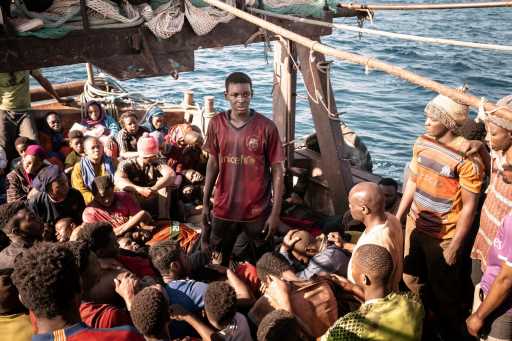‘Io Capitano’ Review: A Gritty, Heartbreaking Study Of Migrant Dreams From Italy’s Matteo Garrone – Venice Film Festival

Even if the critical reactions have been mixed, Italian films have proven much stronger than usual at this year’s Venice Film Festival, with a notable resurgence of genre filmmaking in the likes of Adagio and Enea. Ironically, Matteo Garrone, the one local director in the selection whose actual stock in trade is genre of all stripes — gangster realism (Gomorrah, Dogman), satirical comedy (Reality), and baroque fantasy (Tale of Tales) — arrived this year with a blisteringly topical drama that might be his most traditional, and best, yet.
Related Stories
Venice Film Festival 2023: All Of Deadline’s Movie Reviews
Venice Film Festival 2023 Photos: Ava DuVernay, ‘Origin’ & ‘In The Land Of Saints And Sinners’ Premieres
Migrant dreams are a hot topic this year, and Garrone’s Io Capitano (literally “Me Captain”) follows hard on the heels of Agnieszka Holland’s Green Border, which covers the same topic from a different angle: where Holland’s film deals with the experience of immigrants as they arrive in Europe, Garrone’s film fills in some of that backstory, showing the punishing process of illegal migration from the point of view of two Senegalese teenagers, Seydou (Seydou Starr) and Moussa (Moustapha Fall).
Seydou lives with his widowed mother and little sisters in Dakar. They are poor and live cramped together under the roof of a tiny, ramshackle house, but family life is happy. In fact, it opens with a joyous sabar party, with Seydou slapping away at the tribal drums while the women dance like crazy in neon wigs and fancy clothes. Seydou’s mother thinks he has been playing football all day, but the 16-year-old has secretly taken a day job as a laborer, being paid cash in hand. His cousin Moussa acts as treasurer and buries the accumulating money in the sand, digging it out every now and then to count and recount it.
The money represents a dream they have: to travel to Europe and become famous pop stars. After the sabar, Seydou blurts this out to his mother, who is furious and forbids it. Seydou gets cold feet, but Moussa insists they press on with the plan. In the market they meet a man they have been told will help them, but he refuses to do so. “Europe is nothing like you imagine,” he yells at them. The boys are shocked to hear that Europe is cold, and that homeless people sleep on the streets. “If you want to die, go!” he shouts. Again, Seydou demurs, but Moussa is undeterred. They will become stars, and of that he is sure. “White people will be asking for your autograph,” he tells Seydou.
After a surreal encounter with a witchdoctor, and a trip to the cemetery to secure the necessary permission to leave from the spirits of their dead ancestors, the two boys take off in the middle of the night, taking a long, cramped bus ride to Agadez in Niger, the first leg of a journey that will take them through the Sahara Desert to Tripoli, and from there to Italy. Along the way, they are fleeced for fake passports — $100 each — that prove useless at the next checkpoint, since they are wearing the same clothes in a passport supposedly issued two years before. Another $50 each changes hands, and off they go.
Garrone will later show the distance the boys intend to travel, and it is quite simply insane. It is also incredibly dangerous; bodies litter the desert; and the psychopathically gonzo Libyan mafia ambush their party, forcing everyone to drink a laxative potion to flush out any hidden cash. When they are taken to a disused prison, where more money will be extorted. Seydou and Moussa are separated in the mayhem, but Seydou presses on, bitterly regretting his decision to leave but realistic about the fact that he can no longer turn back.
DoP Paolo Carnera — who also shot the luminous Adagio — captures all this with stunning, immersive, immediacy, vividly rendering the romantic beauty of the desert, despite the human cost of its deadly siren call. There are flashes of magic realism, too, as when Seydou tries to save the life of a woman who simply cannot take another step, or the time he summons the witchdoctor to tell his mother he loves her.
Despite its technical elegance — and the film is near flawless in that respect — the biggest achievement in Garrone’s film is its casting. Using non-professionals found in an open call, it is authentic at every step of its audacious journey. Star of the show, however, is newcomer Starr, who plays the lead and carries the whole movie on his shoulders like a seasoned pro, nailing the entire film in a final, heart-breaking close-up that depicts a seething confluence of contradictory emotions in a way there just isn’t a word for. If there is more profound moment at this festival, or even this year, I’d like to see it.
Title: Io Capitano
Festival: Venice (Competition)
Director: Matteo Garrone
Screenwriters: Matteo Garrone, Massimo Gaudioso, Massimo Ceccherini, Andrea Tagliaferri
Cast: Seydou Sarr, Moustapha Fall, Issaka Sawagodo, Hichem Yacoubi
Running time: 2hr 1 min
Sales agent: Pathé Films
Must Read Stories
‘Origin’ Review & Ava DuVernay Q&A; Jack Huston Interview; Richard Linklater; More
Hulu Stake Sale Timeline Moved Up; Valuation Likely To Far Exceed Initial $27.5B
Jessica Lange, Jim Parsons & Celia Keenan-Bolger Broadway-Bound In Paula Vogel Play
Motion Picture Academy Reschedules Governors Awards Amid Strike-Related Delay
Read More About:
Source: Read Full Article





